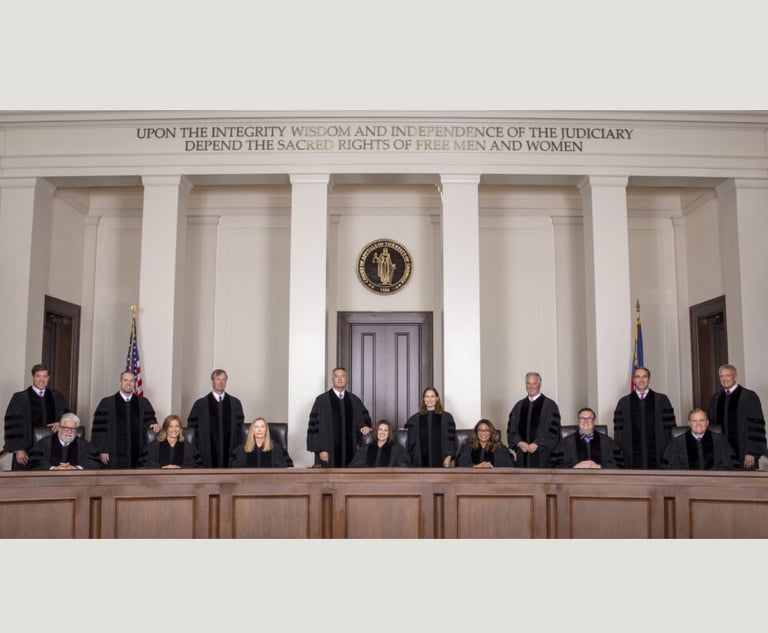 Alan David Tucker, Tucker & Browning, Brunswick, Georgia. (Courtesy photo)
Alan David Tucker, Tucker & Browning, Brunswick, Georgia. (Courtesy photo)Meet the Lawyer Who Leaked the Ahmaud Arbery Shooting Video
Alan David Tucker lives on St. Simons Island and has practiced law in nearby Brunswick for nearly four decades. Now he's become known for his role in releasing a video that went viral and led to two arrests for murder on a Glynn County road.
May 13, 2020 at 02:25 PM
7 minute read
A longtime criminal defense attorney who says he leaked the video of the Ahmaud Arbery shooting to bring the truth to light has been caught up in a swirling controversy himself.
"If we tell the truth, we get justice," Alan David Tucker of Tucker & Browning said Tuesday in a phone interview from his office in downtown Brunswick. "It's why we take an oath to tell the truth, the whole truth and nothing but the truth."
Tucker said his motivations have been misconstrued, and his words manipulated, to convey a false narrative. He said he's been inaccurately portrayed as leaking the video to try to justify the actions of the men who've now been arrested and charged with murder: Gregory McMichael, 64, and Travis McMichael, 34, a father and son. Tucker said he's been accused of violating the attorney-client privilege—some lawyers have threatened to have him disbarred, he said—even though he is not representing the McMichaels or anyone else involved in the case. But he said some lawyers have told him he acted with honor.
Tucker said his mother and stepfather live in Satilla Shores, the subdivision where Arbery was killed on Feb. 23. He said they've been afraid for their safety because of protests over the shooting and outraged posts on social media, escalating as time wore on without arrests.
Tucker was pulled into the tragic story on April 30, when Greg McMichael came to his office for advice—not as a client, but as a friend. Before he retired, the elder McMichael was an investigator for the local district attorney. Tucker, 63, has been a criminal defense attorney in the area for 39 years. They knew each other from their work.
Tucker said rumors circulating in the community about what happened were wildly inaccurate. The police had been in possession of the video of the shooting since it happened but had not made it public. "The video needed to be seen," Tucker said.
Tucker said he received a cellphone with the video the next day—late on Friday, May 1. He waited until Monday, May 4, when his technically savvy paralegal came in to help him create a clear image of the video in a shareable form. He had it delivered to a local reporter friend, who shared it on social media. The attorneys representing the Arbery family immediately began sharing it on social media as well, as did a lot of other people. The governor, the attorney general and the director of the Georgia Bureau of Investigation saw it. They offered the GBI's help on May 5, which was accepted by the prosecutor who'd been assigned the case after two others recused. Two days later, the McMichaels were arrested.
The day after, Friday, May 8, GBI Director Vic Reynolds held a 9 a.m. news conference in Brunswick, saying he had found sufficient probable cause to make the arrests and that his office would continue investigating every aspect of the case. He preempted by an hour a scheduled protest over the lack of arrests. That event continued with a new mantra repeated there and in public comments from the Arbery family civil rights attorneys: "It wasn't because they saw the video, it was because we saw the video."
That same Friday morning, Tucker said, he arrived at his office to find a national news crew. They had been waiting for an hour by then. He said he gave a 20-minute interview that was cut to about 20 seconds—enough time for half a sentence. That half-sentence suggested that, if Arbery had frozen instead of fighting back when a man approached him with a gun, maybe he wouldn't have been shot. The implication, Tucker said, was that he was somehow suggesting Arbery deserved to die—which is absolutely untrue, he said.
"There are a whole lot of 'maybes,' but the problem is, it did happen, and it's unfortunate, it's horrible. I'm not by any means trying to justify anything," Tucker said.
The context of that half-sentence, Tucker said, was that he asked the reporter, "Have you ever had a gun pointed at you?"
"I have, on three occasions," Tucker said in the interview, giving his own answer to that question. "You don't know what you'd do until it happens." Tucker said in the interview that the choices are: flee, fight or freeze. Tucker said that, in his own situation, he made the calculation that the safest option was to freeze. And he survived.
And what were those three occasions? One was a robbery. One was the police, Tucker said.
And the other? An ex-girlfriend.
Asked if any of them were former clients, Tucker said, "I've never had a client point a gun at me."
Tucker said he's never wanted to be anything other than a criminal defense attorney. The dream began when he was 6 or 7, around first grade, watching "Perry Mason" on a black-and-white television. He told his then-single mother he wanted to be a lawyer. She told him to go for it.
Tucker grew up on St. Simons Island near Brunswick on the Georgia coast, where he still lives. His parents divorced when he was 5. He said he and his mother and brother didn't always have enough to eat. His first job was working for a restaurant for 50 cents an hour. He was 11. When he was older, he got a better paying job on a construction crew "swinging a hammer" for $3 or $4 an hour, he said.
With that hammer, he said, he worked his way through school: Glynn Academy in 1974, Oral Roberts University of Tulsa in 1978 and the University of Georgia School of Law in 1981.
His first legal job was as a staff attorney at what he calls "the notorious" Georgia State Prison in Reidsville.
In 1982, he opened his own law practice in Brunswick. Since then, he has won acquittal in six murder trials, he said. He said he still has a robust criminal defense practice, but some clients have trouble paying. He also handles personal injury, workers' compensation, business law and real estate.
The civil side of his practice is the reason he decided not to represent Greg McMichael after the arrests. And that brings the story back to the video. Tucker said he went public with a statement identifying himself as the leaker because the Glynn County Police Department—in a letter that would be made public—asked the GBI to investigate how the video was released, and the GBI announced its agreement to do that. He was afraid police officers would be unfairly blamed and get into trouble with their superiors for leaking the video, he said.
Once Tucker's name was swept into the national story, he said, the publicity quickly reached successful plaintiffs lawyers who regularly hire him as local counsel. Out of public relations concerns, he said, those attorneys said they'd have to part ways if he took on McMichael's defense.
"I eat well now," he said. "I don't want to go hungry again."
Tucker's mother remarried 35 years ago, and she and her husband—Tucker's stepfather—moved to Satilla Shores. At the moment, though, Tucker said she's staying with him and his wife on St. Simons because she's afraid to go home.
This content has been archived. It is available through our partners, LexisNexis® and Bloomberg Law.
To view this content, please continue to their sites.
Not a Lexis Subscriber?
Subscribe Now
Not a Bloomberg Law Subscriber?
Subscribe Now
NOT FOR REPRINT
© 2025 ALM Global, LLC, All Rights Reserved. Request academic re-use from www.copyright.com. All other uses, submit a request to [email protected]. For more information visit Asset & Logo Licensing.
You Might Like
View All
Burr & Forman, Smith Gambrell & Russell Promote More to Partner This Year
7 minute read
Few Atlanta-Centric Law Firms Expected to Pay Associate Bonuses at Market Scale
5 minute read
Experts Not Foreseeing More Rules Governing Prosecutors' Actions After Georgia Court's Removal of DA From Election Case
8 minute read
Trending Stories
Who Got The Work
Michael G. Bongiorno, Andrew Scott Dulberg and Elizabeth E. Driscoll from Wilmer Cutler Pickering Hale and Dorr have stepped in to represent Symbotic Inc., an A.I.-enabled technology platform that focuses on increasing supply chain efficiency, and other defendants in a pending shareholder derivative lawsuit. The case, filed Oct. 2 in Massachusetts District Court by the Brown Law Firm on behalf of Stephen Austen, accuses certain officers and directors of misleading investors in regard to Symbotic's potential for margin growth by failing to disclose that the company was not equipped to timely deploy its systems or manage expenses through project delays. The case, assigned to U.S. District Judge Nathaniel M. Gorton, is 1:24-cv-12522, Austen v. Cohen et al.
Who Got The Work
Edmund Polubinski and Marie Killmond of Davis Polk & Wardwell have entered appearances for data platform software development company MongoDB and other defendants in a pending shareholder derivative lawsuit. The action, filed Oct. 7 in New York Southern District Court by the Brown Law Firm, accuses the company's directors and/or officers of falsely expressing confidence in the company’s restructuring of its sales incentive plan and downplaying the severity of decreases in its upfront commitments. The case is 1:24-cv-07594, Roy v. Ittycheria et al.
Who Got The Work
Amy O. Bruchs and Kurt F. Ellison of Michael Best & Friedrich have entered appearances for Epic Systems Corp. in a pending employment discrimination lawsuit. The suit was filed Sept. 7 in Wisconsin Western District Court by Levine Eisberner LLC and Siri & Glimstad on behalf of a project manager who claims that he was wrongfully terminated after applying for a religious exemption to the defendant's COVID-19 vaccine mandate. The case, assigned to U.S. Magistrate Judge Anita Marie Boor, is 3:24-cv-00630, Secker, Nathan v. Epic Systems Corporation.
Who Got The Work
David X. Sullivan, Thomas J. Finn and Gregory A. Hall from McCarter & English have entered appearances for Sunrun Installation Services in a pending civil rights lawsuit. The complaint was filed Sept. 4 in Connecticut District Court by attorney Robert M. Berke on behalf of former employee George Edward Steins, who was arrested and charged with employing an unregistered home improvement salesperson. The complaint alleges that had Sunrun informed the Connecticut Department of Consumer Protection that the plaintiff's employment had ended in 2017 and that he no longer held Sunrun's home improvement contractor license, he would not have been hit with charges, which were dismissed in May 2024. The case, assigned to U.S. District Judge Jeffrey A. Meyer, is 3:24-cv-01423, Steins v. Sunrun, Inc. et al.
Who Got The Work
Greenberg Traurig shareholder Joshua L. Raskin has entered an appearance for boohoo.com UK Ltd. in a pending patent infringement lawsuit. The suit, filed Sept. 3 in Texas Eastern District Court by Rozier Hardt McDonough on behalf of Alto Dynamics, asserts five patents related to an online shopping platform. The case, assigned to U.S. District Judge Rodney Gilstrap, is 2:24-cv-00719, Alto Dynamics, LLC v. boohoo.com UK Limited.
Featured Firms
Law Offices of Gary Martin Hays & Associates, P.C.
(470) 294-1674
Law Offices of Mark E. Salomone
(857) 444-6468
Smith & Hassler
(713) 739-1250






